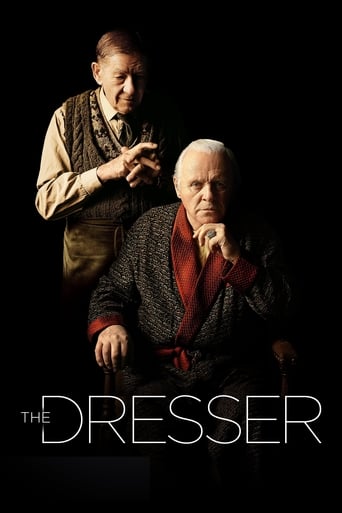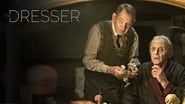kagu
I have never seen the play, but based on the movie I'm sure it is a deeply moving piece beautifully crafted for minimalist theater. A somewhat meta-King Lear, Anthony Hopkins and Ian McKellen are masterful and charming in this adaptation. However, all the trappings of a film feel unnecessary. There's something just a bit off about watching a movie both celebrating and mourning the desperation, obsession, and beauty of the theater. This movie was not at all bad, but it's something that needs you to emotionally connect and watching it on screen creates a degree of separation that hinders that connection. If The Dresser were to show up on stage I would see it in a heartbeat, but I can't say that it's something I would ever watch on film a second time.
Prismark10
Ronald Harwood's stage play was adapted for film in 1983 and received multiple Oscar nominations and a fruity performance from Albert Finney.Harwood's play has now been adapted for television. Harwood wanted it to be a stage revival with Anthony Hopkins but he called time on his stage career several decades ago and so we get Hopkins for the television film.I remember soon after Laurence Olivier died, it was Hopkins who introduced a special tribute programme on the BBC. Then he was regarded as an actor who never quiet fulfilled his immense talent on the stage or screen. He had been Olivier's understudy at the National Theater. Wild living and booze got the better off him. Hopkins was not averse to do highly paid thrash like Hollywood Wives for American television. He would also do more credible British television films, usually for the BBC and every now and then wow the stage in plays such as David Hare's Pravda.Within a few years after that introduction of that tribute to Olivier, Hopkins entered his own golden era first by bagging a best actor Oscar for Silence of the Lambs. He would get three other Oscar nominations in the 1990s and got to work with directors such as Spielberg and Oliver Stone. He would be regarded as one of the best actors of his generation.In The Dresser Hopkins returns to BBC television after some years and teams up with Ian McKellen for the first time on-screen. McKellen is the loyal, camp, alcoholic dresser to Hopkin's Sir, the domineering actor-manager (based on Sir Donald Wolfit) touring up and down the various stages of Britain during World War 2.In his advancing years and in ill health, he is not up to playing the big roles, in this case King Lear. He needs all the help from his Dresser just to get on the stage and recite the opening lines.Hopkins lays bare an actor who once thrilled the crowd, womanised, was adored and is self absorbed. Emily Watson plays the much maligned wife who in many ways has had enough of him, always playing second fiddle to the detriment of her own career. Then again so has the waspish McKellen and we see in the end as his anger and vindictiveness bubbles through.Director Richard Eyre has deliberately not opened the play up too much. It is kept small and intimate. We get to see Hopkins deliver bits of King Lear as Sir gets to the stage and delivers one big final performance. Look out for Edward Fox playing an actor drafted in at the last moment to play the Fool who delivers a tender monologue when he drops by to pay his respects to Sir after the performance.
The Old Bag -
It's funny how 32 years can fly past so quickly. It's one of those titles you'd have thought they'd never dare tackle, but sure enough they did. Thoughts before watching, they won't hold a candle to the mastery of Messers Courtenay and Finney. Was Hopkins right for Sir?Thoughts after watching, a successful outing for two acting greats that managed so amuse and sadden. McKellen expertly cast, Hopkins shone after twenty minutes or so. It generated a level of intimacy, similar to the feeling captured only live on stage.A nice touch having Edward Fox in the remake, he'd been marvelously cold as Oxenby back in '83. The part where he touchingly pleads for work was beautiful.
l_rawjalaurence
Inevitably Richard Eyre's remake of Ronald Harwood's 1980 play is going to be compared with Peter Yates's 1983 film starring Albert Finney and Tom Courtenay. In thematic terms, this production more than holds its own. Eyre stresses the symbiotic bond between Sir (Anthony Hopkins) and Norman (Ian McKellen) through a clever use of grouping; the two of them are invariably seen together in the same shot, even when Norman is standing some way away from his employer. The two men are like Yin and Yang; neither can exist without the other. Norman has no life other than within the touring company; while Sir has the undoubted talent to run the outfit on his own, he needs a sounding-board, and Norman more than adequately fulfills the role. We also get some sense of why Shakespeare is so important to Sir, his company, and his audiences. For Sir it is a means of defining his identity; perhaps more than living with his wife Pussy (aka Her Ladyship) (Emily Watson). Through Shakespeare he can maintain a fantasy-world of power in which he exists at the top of the tree, and can maintain a benevolent despotism over the remainder of his company. Even when at the limits of sanity, it is Shakespeare who keeps him going. For the company, the chance to work in Shakespeare is equally identity-defining. Thornton (Edward Fox) is a bit-part player given an unexpected chance to play the Fool in KING LEAR. After a lifetime in the shadows, he has the chance to become someone, even if he might lack the talent to do so. Although the company might be tatty, the sets and costumes primitive, it can still provide opportunities that might never exist elsewhere. For audiences, the chance to see Sir performing during the midst of an air-raid represents an opportunity not only to see Shakespeare live, but to share in a collective experience that provides security for everyone. Yet the coherence of this production has been disrupted somewhat by the casting of Hopkins in the role of Sir. An undoubted talent in his own right, he lacks the power and the star quality demanded by the role; we have to know that Sir is a romantic talent, someone who can attract attention through sheer emotional power. Hopkins's rendition of Sir as King Lear is far too low-key in tone; it does not demonstrate the character's suffering, and thereby prove just how much the actor welcomes the role. Ian McKellen makes a convincing Norman, all bird-like gestures and conscious camp. One memorable moment occurs right at the end of the production, when Sir has passed away. Norman reads the beginnings of the autobiography Sir has written; finds his name absent; slumps in a chair and sticks his tongue out like a child towards Sir's corpse. He wants to break free of the dead actor's influence, but knows that he cannot. The production ends with a shot of the theater in which Sir dies, looking out from the stage into the auditorium. A stagehand crosses the playing area; the lights go out and the action fades to black. This moment emphasizes just how much a story of the theater THE DRESSER is; roles matter more than truth for everyone.




